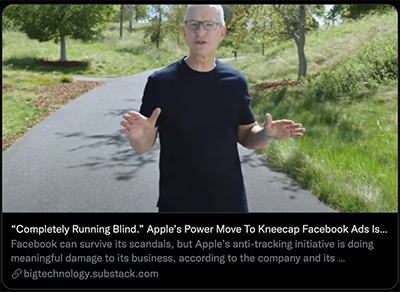 |
||||||||
|
||||||||
| The Future of the Internet Is Complicated |

Image by Gerd Altmann from Pixabay
|
| Apple, Google and Facebook really know how to throw a party. We’ve got pop-up ads on our Apple devices asking if we want to be tracked, plans from Chrome to disable third-party cookie tracking technology and Facebook conjuring a way to show ads that don’t use a person’s data. Let’s not forget that Apple’s iOS 15 will shut down data sharing all the more, possibly opening the door to its own personalized advertising network. What’s the open web’s advertising ecosystem to do, when every aspect of what keeps it alive is changing in a massive way? “More than 20 years ago, the internet drove an upheaval in the advertising industry. It eviscerated newspapers and magazines that had relied on selling classified and print ads, and threatened to dethrone television advertising as the prime way for marketers to reach large audiences. Now a $350 billion digital ad industry is being dismantled.” |
| Something needs to take the place of third-party tracking data. But what? “The internet is answering a question that it’s been wrestling with for decades, which is: How is the internet going to pay for itself,” said Jeff Green, the chief executive of the Trade Desk. There’s no such thing as a free lunch and each tech giant has their own set of ideas about how much ad tracking should be pulled back. "Website creators may eventually choose sides, so some sites that work well in Google’s browser might not even load in Apple’s browser, said Brendan Eich, a founder of Brave, the private web browser. “It will be a tale of two internets,” he said. Will it come down to a world where a business will have to weigh its options and decide what browser is more profitable and update accordingly, knowing that its website may not function to a decent percentage of users? (Perhaps we’re headed for user-controlled Web3 that will be powered by blockchain afterall. No?) Sheri Bachstein, the head of IBM Watson Advertising, warned that the privacy shifts meant that relying solely on advertising for revenue was at risk. Businesses must adapt, she said, including by charging subscription fees and using artificial intelligence to help serve ads. “The big tech companies have put a clock on us,” she said in an interview. This could also help explain why The New York Times is doubling down on building an advertising business from a subscription-first model. |
| FTC Coming After Big Tech and How It’s Built |
| Another day, another issue with the FTC coming for Big Tech. This time, it centers around how Big Tech amasses its riches. Turns out, it’s the hundreds of small acquisitions that avoid regulator scrutiny. “Big Tech has often grown in stealthier ways through hundreds of much smaller transactions. Companies use acquisitions to shell out for talent in so-called acqui-hires, vacuum up intellectual property from startups, stick a foot in the doors of lucrative new industries and build up features for new marquee offerings. Small deals helped Amazon to boost its connected devices, Google to build its massive online ads business and Apple to revamp its Maps app.” |
| Hundreds of mergers avoid scrutiny if they fall below a certain amount: $92 million in 2021. These deals “don't need to be disclosed to or approved by antitrust regulators.” Are slow, steady, small purchases what helped make the duopoly, er, triopoly what it is today? This makes it sound way easier to attain world domination than expected. "I think of serial acquisitions as a Pac-Man strategy," Rebecca Kelly Slaughter, one of the commission's three Democrats, said Wednesday. "Each individual merger, viewed independently, may not seem to have significant impact, but the collective impact of hundreds of smaller acquisitions can lead to a monopolistic behemoth.” The FTC Democrats also want to reverse Trump-era rules that many say favored vertical deals. “Vertical transactions occur when a company acquires another firm in its supply chain — for example, if a juice producer purchases an orange distributor, or a broadband provider such as AT&T purchases a content company like Time Warner.” “FTC Chair Lina Khan, an outspoken critic of Big Tech's market power, said the report captures the extent to which these firms have devoted tremendous resources to acquiring startups, patent portfolios and entire teams of technologists, and how they were able to do so largely outside of the purview of the antitrust agencies. She recommended reexamining how the FTC administers the thresholds for disclosure.” We said it once, maybe twice, maybe even thrice — imagine if Google never acquired DoubleClick. |
 |
||||||||||
|
||||||||||
 |
||||||||||
 |
||||||||||
|









